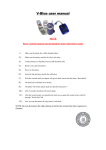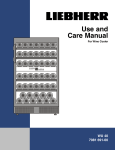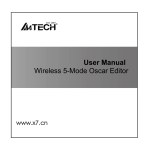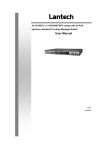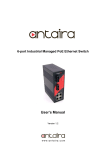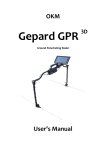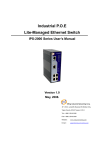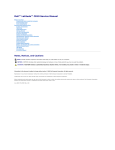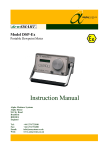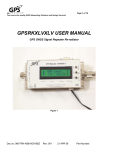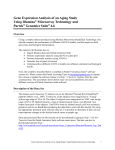Download Bomb Manual PDF - Bomb Defusal Manual
Transcript
BOMB DEFUSAL MANUAL Version 1 Verification Code: 241 Revision 3 Keep Talking and Nobody Explodes v. 1 Introduction Welcome to the dangerous and challenging world of bomb defusing. Study this manual carefully; you are the expert. In these pages you will find everything you need to know to defuse even the most insidious of bombs. And remember — One small oversight and it could all be over! Page 2 of 23 Keep Talking and Nobody Explodes v. 1 Defusing Bombs Defusing Bombs A bomb will explode when its countdown timer reaches 0:00 or when too many strikes have been recorded. The only way to defuse a bomb is to disarm all of its modules before its countdown timer expires. Example Bomb Front Side Modules Each bomb will include up to 11 modules that must be disarmed. Each module is discrete and can be disarmed in any order. Instructions for disarming modules can be found in Section 1. "Needy" modules present a special case and are described in Section 2. Strikes When the Defuser makes a mistake the bomb will record a strike which will be displayed on the indicator above the countdown timer. Bombs with a strike indicator will explode upon the third strike. The timer will begin to count down faster after a strike has been recorded. Strike Indicator If no strike indicator is present above the countdown timer, the bomb will explode upon the first strike, leaving no room for error. Gathering Information Some disarming instructions will require specific information about the bomb, such as the serial number. This type of information can typically be found on the top, bottom, or sides of the bomb casing. See Appendix A, B, and C for identification instructions that will be useful in disarming certain modules. Page 3 of 23 Keep Talking and Nobody Explodes v. 1 Section 1: Modules Modules can be identified by an LED in the top right corner. When this LED is lit green the module has been disarmed. All modules must be disarmed to defuse the bomb. Page 4 of 23 Section 1: Modules Keep Talking and Nobody Explodes v. 1 Wires On the Subject of Wires Wires are the lifeblood of electronics! Wait, no, electricity is the lifeblood. Wires are more like the arteries. The veins? No matter… A wire module can have 3-6 wires on it. Only the one correct wire needs to be cut to disarm the module. Wire ordering begins with the first on the top. 3 wires: If there are no red wires, cut the second wire. Otherwise, if the last wire is white, cut the last wire. Otherwise, if there is more than one blue wire, cut the last blue wire. Otherwise, cut the last wire. 4 wires: If there is more than one red wire and the last digit of the serial number is odd, cut the last red wire. Otherwise, if the last wire is yellow and there are no red wires, cut the first wire. Otherwise, if there is exactly one blue wire, cut the first wire. Otherwise, if there is more than one yellow wire, cut the last wire. Otherwise, cut the second wire. 5 wires: If the last wire is black and the last digit of the serial number is odd, cut the fourth wire. Otherwise, if there is exactly one red wire and there is more than one yellow wire, cut the first wire. Otherwise, if there are no black wires, cut the second wire. Otherwise, cut the first wire. 6 wires: If there are no yellow wires and the last digit of the serial number is odd, cut the third wire. Otherwise, if there is exactly one yellow wire and there is more than one white wire, cut the fourth wire. Otherwise, if there are no red wires, cut the last wire. Otherwise, cut the fourth wire. Page 5 of 23 Keep Talking and Nobody Explodes v. 1 The Button On the Subject of The Button You might think that a button telling you to press it is pretty straightforward. That’s the kind of thinking that gets people exploded. See Appendix A for indicator identification reference. See Appendix B for battery identification reference. Follow these rules in the order they are listed. Perform the first action that applies: 1. If the button is blue and the button says "Abort", hold the button and refer to "Releasing a Held Button". 2. If there is more than 1 battery on the bomb and the button says "Detonate", press and immediately release the button. 3. If the button is white and there is a lit indicator with label CAR, hold the button and refer to "Releasing a Held Button". 4. If there are more than 2 batteries on the bomb and there is a lit indicator with label FRK, press and immediately release the button. 5. If the button is yellow, hold the button and refer to "Releasing a Held Button". 6. If the button is red and the button says "Hold", press and immediately release the button. 7. If none of the above apply, hold the button and refer to "Releasing a Held Button". Releasing a Held Button If you start holding the button down, a colored strip will light up on the right side of the module. Based on its color you must release the button at a specific point in time: Blue strip: release when the countdown timer has a 4 in any position. White strip: release when the countdown timer has a 1 in any position. Yellow strip: release when the countdown timer has a 5 in any position. Any other color strip: release when the countdown timer has a 1 in any position. Page 6 of 23 Keep Talking and Nobody Explodes v. 1 On the Subject of Keypads I'm not sure what these symbols are, but I suspect they have something to do with occult. Only one column below has all four of the symbols from the keypad. Press the four buttons in the order their symbols appear from top to bottom within that column. Page 7 of 23 Keypads Keep Talking and Nobody Explodes v. 1 Simon Says On the Subject of Simon Says This is like one of those toys you played with as a kid where you have to match the pattern that appears, except this one is a knockoff that was probably purchased at a dollar store. 1. One of the four colored buttons will flash. 2. Using the correct table below, press the button with the corresponding color. 3. The original button will flash, followed by another. Repeat this sequence in order using the color mapping. 4. The sequence will lengthen by one each time you correctly enter a sequence until the module is disarmed. If the serial number contains a vowel: Red Flash No Strikes Button to press: Blue Flash Green Flash Yellow Flash Blue Red Yellow Green 1 Strike Yellow Green Blue Red 2 Strikes Green Red Yellow Blue If the serial number does not contain a vowel: Red Flash Button to press: Blue Flash Green Flash Yellow Flash No Strikes Blue Yellow Green Red 1 Strike Red Blue Yellow Green 2 Strikes Yellow Green Blue Red Page 8 of 23 Keep Talking and Nobody Explodes v. 1 Who's on First On the Subject of Who’s on First This contraption is like something out of a sketch comedy routine, which might be funny if it wasn't connected to a bomb. I’ll keep this brief, as words only complicate matters. 1. Read the display and use step 1 to determine which button label to read. 2. Using this button label, use step 2 determine which button to push. 3. Repeat until the module has been disarmed. Step 1: Based on the display, read the label of a particular button and proceed to step 2: YES FIRST DISPLAY OKAY SAYS NOTHING BLANK NO LED LEAD READ RED REED LEED HOLD ON YOU YOU ARE YOUR YOU'RE UR THERE THEY'RE THEIR THEY ARE SEE C CEE Page 9 of 23 Keep Talking and Nobody Explodes v. 1 Who's on First Step 2: Using the label from step 1, push the first button that appears in its corresponding list: "READY": YES, OKAY, WHAT, MIDDLE, LEFT, PRESS, RIGHT, BLANK, READY, NO, FIRST, UHHH, NOTHING, WAIT "FIRST": LEFT, OKAY, YES, MIDDLE, NO, RIGHT, NOTHING, UHHH, WAIT, READY, BLANK, WHAT, PRESS, FIRST "NO": BLANK, UHHH, WAIT, FIRST, WHAT, READY, RIGHT, YES, NOTHING, LEFT, PRESS, OKAY, NO, MIDDLE "BLANK": WAIT, RIGHT, OKAY, MIDDLE, BLANK, PRESS, READY, NOTHING, NO, WHAT, LEFT, UHHH, YES, FIRST "NOTHING": UHHH, RIGHT, OKAY, MIDDLE, YES, BLANK, NO, PRESS, LEFT, WHAT, WAIT, FIRST, NOTHING, READY "YES": OKAY, RIGHT, UHHH, MIDDLE, FIRST, WHAT, PRESS, READY, NOTHING, YES, LEFT, BLANK, NO, WAIT "WHAT": UHHH, WHAT, LEFT, NOTHING, READY, BLANK, MIDDLE, NO, OKAY, FIRST, WAIT, YES, PRESS, RIGHT "UHHH": READY, NOTHING, LEFT, WHAT, OKAY, YES, RIGHT, NO, PRESS, BLANK, UHHH, MIDDLE, WAIT, FIRST "LEFT": RIGHT, LEFT, FIRST, NO, MIDDLE, YES, BLANK, WHAT, UHHH, WAIT, PRESS, READY, OKAY, NOTHING "RIGHT": YES, NOTHING, READY, PRESS, NO, WAIT, WHAT, RIGHT, MIDDLE, LEFT, UHHH, BLANK, OKAY, FIRST "MIDDLE": BLANK, READY, OKAY, WHAT, NOTHING, PRESS, NO, WAIT, LEFT, MIDDLE, RIGHT, FIRST, UHHH, YES "OKAY": MIDDLE, NO, FIRST, YES, UHHH, NOTHING, WAIT, OKAY, LEFT, READY, BLANK, PRESS, WHAT, RIGHT "WAIT": UHHH, NO, BLANK, OKAY, YES, LEFT, FIRST, PRESS, WHAT, WAIT, NOTHING, READY, RIGHT, MIDDLE "PRESS": RIGHT, MIDDLE, YES, READY, PRESS, OKAY, NOTHING, UHHH, BLANK, LEFT, FIRST, WHAT, NO, WAIT "YOU": SURE, YOU ARE, YOUR, YOU'RE, NEXT, UH HUH, UR, HOLD, WHAT?, YOU, UH UH, LIKE, DONE, U "YOU ARE": YOUR, NEXT, LIKE, UH HUH, WHAT?, DONE, UH UH, HOLD, YOU, U, YOU'RE, SURE, UR, YOU ARE "YOUR": UH UH, YOU ARE, UH HUH, YOUR, NEXT, UR, SURE, U, YOU'RE, YOU, WHAT?, HOLD, LIKE, DONE "YOU'RE": YOU, YOU'RE, UR, NEXT, UH UH, YOU ARE, U, YOUR, WHAT?, UH HUH, SURE, DONE, LIKE, HOLD "UR": DONE, U, UR, UH HUH, WHAT?, SURE, YOUR, HOLD, YOU'RE, LIKE, NEXT, UH UH, YOU ARE, YOU "U": UH HUH, SURE, NEXT, WHAT?, YOU'RE, UR, UH UH, DONE, U, YOU, LIKE, HOLD, YOU ARE, YOUR "UH HUH": UH HUH, YOUR, YOU ARE, YOU, DONE, HOLD, UH UH, NEXT, SURE, LIKE, YOU'RE, UR, U, WHAT? "UH UH": UR, U, YOU ARE, YOU'RE, NEXT, UH UH, DONE, YOU, UH HUH, LIKE, YOUR, SURE, HOLD, WHAT? "WHAT?": YOU, HOLD, YOU'RE, YOUR, U, DONE, UH UH, LIKE, YOU ARE, UH HUH, UR, NEXT, WHAT?, SURE "DONE": SURE, UH HUH, NEXT, WHAT?, YOUR, UR, YOU'RE, HOLD, LIKE, YOU, U, YOU ARE, UH UH, DONE "NEXT": WHAT?, UH HUH, UH UH, YOUR, HOLD, SURE, NEXT, LIKE, DONE, YOU ARE, UR, YOU'RE, U, YOU "HOLD": YOU ARE, U, DONE, UH UH, YOU, UR, SURE, WHAT?, YOU'RE, NEXT, HOLD, UH HUH, YOUR, LIKE "SURE": YOU ARE, DONE, LIKE, YOU'RE, YOU, HOLD, UH HUH, UR, SURE, U, WHAT?, NEXT, YOUR, UH UH "LIKE": YOU'RE, NEXT, U, UR, HOLD, DONE, UH UH, WHAT?, UH HUH, YOU, LIKE, SURE, YOU ARE, YOUR Page 10 of 23 Keep Talking and Nobody Explodes v. 1 Memory On the Subject of Memory Memory is a fragile thing but so is everything else when a bomb goes off, so pay attention! Press the correct button to progress the module to the next stage. Complete all stages to disarm the module. Pressing an incorrect button will reset the module back to stage 1. Button positions are ordered from left to right. Stage 1: If the display is 1, press the button in the second position. If the display is 2, press the button in the second position. If the display is 3, press the button in the third position. If the display is 4, press the button in the fourth position. Stage 2: If the display is 1, press the button labeled "4". If the display is 2, press the button in the same position as you pressed in stage 1. If the display is 3, press the button in the first position. If the display is 4, press the button in the same position as you pressed in stage 1. Stage 3: If the display is 1, press the button with the same label you pressed in stage 2. If the display is 2, press the button with the same label you pressed in stage 1. If the display is 3, press the button in the third position. If the display is 4, press the button labeled "4". Stage 4: If the display is 1, press the button in the same position as you pressed in stage 1. If the display is 2, press the button in the first position. If the display is 3, press the button in the same position as you pressed in stage 2. If the display is 4, press the button in the same position as you pressed in stage 2. Stage 5: If the display is 1, press the button with the same label you pressed in stage 1. If the display is 2, press the button with the same label you pressed in stage 2. If the display is 3, press the button with the same label you pressed in stage 4. If the display is 4, press the button with the same label you pressed in stage 3. Page 11 of 23 Keep Talking and Nobody Explodes v. 1 Morse Code On the Subject of Morse Code An antiquated form of naval communication? What next? At least it's genuine Morse Code, so pay attention and you might just learn something. Interpret the signal from the flashing light using the Morse Code chart to spell one of the words in the table. The signal will loop, with a long gap between repetitions. Once the word is identified, set the corresponding frequency and press the transmit (TX) button. How to Interpret 1. A short flash represents a dot. 2. A long flash represents a dash. 3. There is a long gap between letters. 4. There is a very long gap before the word repeats. A B C D E F G H I J K L M N O P Q R S T U V W X Y Z 1 2 3 4 5 6 7 8 9 0 Page 12 of 23 If the word is: Respond at frequency: shell 3.505 MHz halls 3.515 MHz slick 3.522 MHz trick 3.532 MHz boxes 3.535 MHz leaks 3.542 MHz strobe 3.545 MHz bistro 3.552 MHz flick 3.555 MHz bombs 3.565 MHz break 3.572 MHz brick 3.575 MHz steak 3.582 MHz sting 3.592 MHz vector 3.595 MHz beats 3.600 MHz Keep Talking and Nobody Explodes v. 1 Complicated Wires On the Subject of Complicated Wires These wires aren't like the others. Some have stripes! That makes them completely different. The good news is that we've found a concise set of instructions on what to do about it! Maybe too concise... Look at each wire: there is an LED above the wire and a space for a "★" symbol below the wire. For each wire/LED/symbol combination, use the Venn diagram below to decide whether or not to cut the wire. Each wire may be striped with multiple colors. C S S S C C P P D S D D B P B B Wire has red coloring Wire has blue coloring Has ★ symbol LED is on Letter Instruction C Cut the wire D Do not cut the wire S Cut the wire if the last digit of the serial number is even P Cut the wire if the bomb has a parallel port B Cut the wire if the bomb has two or more batteries See Appendix B for battery identification reference. See Appendix C for port identification reference. Page 13 of 23 Keep Talking and Nobody Explodes v. 1 Wire Sequences On the Subject of Wire Sequences It's hard to say how this mechanism works. The engineering is pretty impressive, but there must have been an easier way to manage nine wires. Within this module there are several panels with wires on them, but only one panel is visible at a time. Switch to the next panel by using the down button and the previous panel by using the up button. Do not switch to the next panel until you are sure that you have cut all necessary wires on the current panel. Cut the wires as directed by the following table. Wire occurrences are cumulative over all panels within the module. Red Wire Occurrences Blue Wire Occurrences Black Wire Occurrences Cut if Wire Occurrence connected to: Cut if Wire Occurrence connected to: Cut if Wire Occurrence connected to: First red occurrence C First blue occurrence B First black occurrence A, B or C Second red occurrence B Second blue occurrence A or C Second black occurrence A or C Third red occurrence A Third blue occurrence B Third black occurrence B Fourth red occurrence A or C Fourth blue occurrence A Fourth black occurrence A or C Fifth red occurrence B Fifth blue occurrence B Fifth black occurrence B Sixth red occurrence A or C Sixth blue occurrence B or C Sixth black occurrence B or C Seventh red occurrence A, B or C Seventh blue occurrence C Seventh black occurrence A or B Eighth red occurrence A or B Eighth blue occurrence A or C Eighth black occurrence C Ninth red occurrence B Ninth blue occurrence A Ninth black occurrence C Page 14 of 23 Keep Talking and Nobody Explodes v. 1 On the Subject of Mazes This seems to be some kind of maze, probably stolen off of a restaurant placemat. Find the maze with matching circular markings. The defuser must navigate the white light to the red triangle using the arrow buttons. Warning: Do not cross the lines shown in the maze. These lines are invisible on the bomb. Page 15 of 23 Mazes Keep Talking and Nobody Explodes v. 1 Passwords On the Subject of Passwords Fortunately this password doesn't seem to meet standard government security requirements: 22 characters, mixed case, numbers in random order without any palindromes above length 3. The buttons above and below each letter will cycle through the possibilities for that position. Only one combination of the available letters will match a password below. Press the submit button once the correct word has been set. about after again below could every first found great house large learn never other place plant point right small sound spell still study their there these thing think three water where which world would write Page 16 of 23 Keep Talking and Nobody Explodes v. 1 Section 2: Needy Modules Section 2: Needy Modules Needy modules cannot be disarmed, but pose a recurrent hazard. Needy modules can be identified as a module with a small 2‑digit timer in the top center. Interacting with the bomb may cause them to become activated. Once activated, these needy modules must be tended to regularly before their timer expires in order to prevent a strike. Stay observant: needy modules may reactivate at any time. Page 17 of 23 Keep Talking and Nobody Explodes v. 1 On the Subject of Venting Gas Computer hacking is hard work! Well, it usually is. This job could probably be performed by a simple drinking bird pressing the same key over and over again. Respond to the computer prompts by pressing "Y" for "Yes" or "N" for "No". Page 18 of 23 Venting Gas Keep Talking and Nobody Explodes v. 1 On the Subject of Capacitor Discharge I'm going to guess that this is just meant to occupy your attention, because otherwise this is some shoddy electronics work. Discharge the capacitor before it overloads by holding down the lever. Page 19 of 23 Capacitor Discharge Keep Talking and Nobody Explodes v. 1 Knobs On the Subject of Knobs Needlessly complicated and endlessly needy. Imagine if such expertise were used to make something other than diabolical puzzles. The knob can be turned to one of four different positions. The knob must be in the correct position when this module's timer hits zero. The correct position can be determined by the on/off configuration of the twelve LEDs. Knob positions are relative to the "UP" label, which may be rotated. LED Configurations Up Position: X X X X X X X X X X X X X X X X X Down Position: X X X X X X X X X X X Left Position: X X X X X X X X X X X Right Position: X X X X X X X X X = Lit LED Page 20 of 23 X X X X X Keep Talking and Nobody Explodes v. 1 Appendix A: Indicator Identification Reference Labelled indicator lights can be found on the sides of the bomb casing. Common Indicators SND CLR CAR IND FRQ SIG NSA MSA TRN BOB FRK Page 21 of 23 Appendix A Keep Talking and Nobody Explodes v. 1 Appendix B Appendix B: Battery Identification Reference Common battery types can be found within enclosures on the sides of the bomb casing. Battery Type AA D Page 22 of 23 Keep Talking and Nobody Explodes v. 1 Appendix C Appendix C: Port Identification Reference Digital and analog ports can be found on sides of the bomb casing. Port Name DVI-D Parallel PS/2 RJ-45 Serial Stereo RCA Page 23 of 23


























